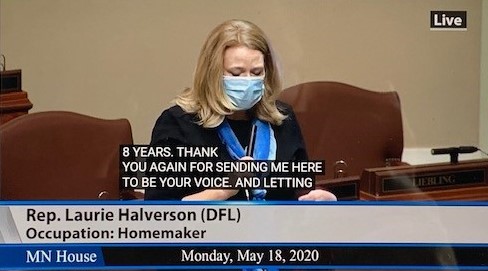With the Legislature’s regular session adjourned, the attention of state leaders turns to the road ahead, which promises to be just as unusual as the regular session. We can be certain that once the political dust settles on immediate issues like a bonding bill, the extent of the Governor’s peacetime emergency powers, and any movement on tax relief measures, the next crisis for Governor Tim Walz and legislative leaders to address will be the state’s bleak economic outlook.
Minnesota Management and Budget (MMB) issued a state budget projection earlier this month that projects a nearly $4 billion swing from earlier this year. The projection notes that “the $2.359 billion budget reserve remains available to mitigate the budgetary impact of the crisis. Given the uncertainty about the path of pandemic, the economic outlook will remain volatile for some time.” We are hearing that these numbers will only get worse and that the state will be looking at spending its entire budget reserve (and then some).
Here is what we will be watching for over the next few months:
– How and when Governor Walz renews/ends the state’s peacetime emergency. Criticisms related to checks and balances and overreach of executive powers have, and will continue, to dominate political discourse. How long the peacetime emergency and related executive powers last will shape all discussions of the state’s projected budget deficit and how to address it.
– How long a special session lasts. While the Governor is likely to call the Legislature into a special session as soon as June 12, he doesn’t have the power to adjourn them. If there continues to be criticism of the Governor’s actions, there may be pressure for the Legislature to not adjourn and instead use its powers to apply pressure to the administration.
– How federal money flows. Federal CARES Act funding will be critical to prop open much of the state’s economy. But again, legislators have frustration if they are not brought into the decision-making process of how and when those dollars are spent. Despite pressure to spend these funds to assist folks and stimulate the economy, the state may not do so all at once, which might help the state’s budget limp by as the economy recovers.
– What will be asked of the state moving forward. Even with tremendous state and federal assistance and the possibility of reopening the economy more each month, businesses will continue to seek state support, which will be more difficult as the state’s budget problems deepen. Similarly, individuals and families will continue to struggle and seek assistance. Expect this to have a trickle-down effect on other sectors like consumer spending, which state government heavily relies on.
– The length of economic tails of COVID-19. While state legislatures are not always known for their long-term planning, addressing the structural budget problems created by COVID-19 will take more than one five-month legislative session.
– November elections. As we saw this session (and nearly every session previously), partisan control of the Governor’s office and legislative bodies plays a significant role in the approach to budget deficits whether through tax increases or scope of budget cuts. If action on the current biennium budget is delayed until next year, there could be a new set of players that will shape this discussion.
In short, by June 30, 2021, lawmakers must balance the state budget for the current biennium because Minnesota cannot deficit spend. Dealing with the state budget will be like trying to address the virus itself – the state will have to make the best decisions it can based on the information available. Minnesota will continue to lack certainty in long-term revenue forecasts which will make solving a budget deficit even more difficult. Lawmakers will be forced to look at more immediate, bold and difficult decisions or be relegated to budget tinkering efforts to make ends meet.
